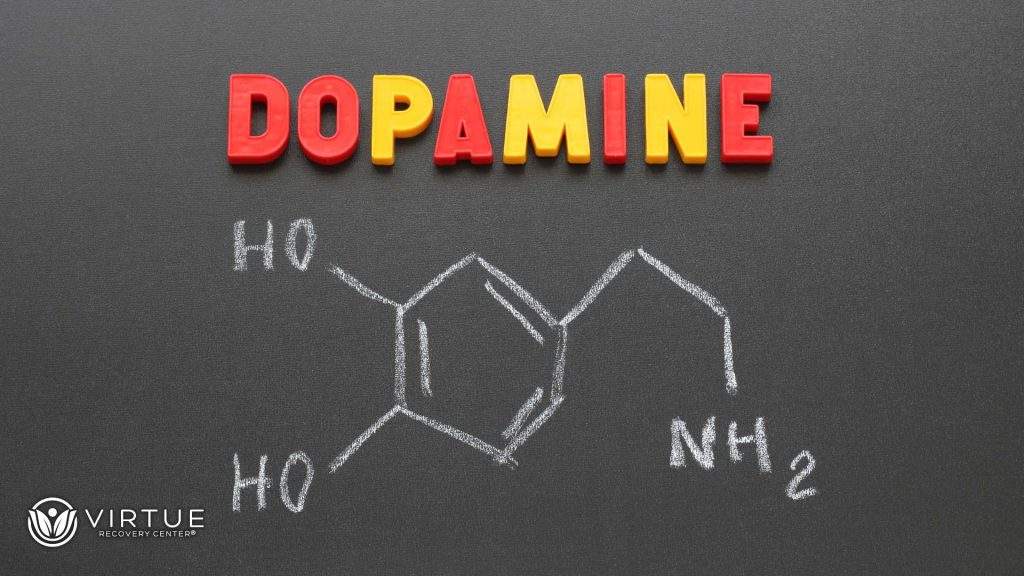Key Takeaways
- Dopamine is a brain chemical linked to pleasure, motivation, and reward.
- Addiction disrupts dopamine balance, leading to withdrawal symptoms.
- Restoring dopamine levels naturally and with professional support aids recovery.
Introduction
Addiction changes the way your brain works, especially when it comes to dopamine. Dopamine is a chemical in the brain that makes you feel happy or rewarded. Substances like drugs and alcohol flood the brain with dopamine, making these substances addictive.
When someone stops using these substances, dopamine levels drop. This imbalance causes withdrawal symptoms like sadness, fatigue, or anxiety. But there’s hope. By managing withdrawal and restoring dopamine levels, you can rebuild your health and begin a life free from addiction.
What is Dopamine, and How Does it Relate to Addiction?
Dopamine is a neurotransmitter that helps send messages to the brain. It’s known as the “feel-good” chemical because it plays a significant role in feelings of pleasure and reward.
Your brain releases dopamine when you eat your favorite food or listen to music you love. But addictive substances, like drugs or alcohol, release much more significant amounts of dopamine. This flood of dopamine makes you feel good temporarily but also tricks your brain into craving more.
How Addiction Changes Dopamine:
- Substances overstimulate the brain’s reward system.
- Over time, the brain produces less dopamine naturally.
- This leads to dependency on substances to feel good or even feel normal.
Addiction doesn’t just harm your body—it changes how your brain works, especially in the areas responsible for decision-making and self-control.
Withdrawal Symptoms and Dopamine Imbalance
When you stop using an addictive substance, your brain struggles to adjust. The sudden lack of dopamine causes withdrawal symptoms, which can feel overwhelming.
Common Withdrawal Symptoms Include:
- Emotional Symptoms: Depression, anxiety, irritability, and mood swings.
- Physical Symptoms: Fatigue, headaches, muscle aches, and sleep problems.
- Cognitive Symptoms: Difficulty concentrating or remembering things.
These symptoms occur because the brain isn’t producing enough dopamine. However, this imbalance is temporary. With time, the brain can heal and start producing dopamine naturally again.
Steps to Reset Dopamine Balance After Addiction
Restoring dopamine levels doesn’t happen overnight, but there are natural ways to help your brain recover.
Eat a Healthy Diet
Certain foods can boost dopamine production. Focus on eating:
- Protein-rich foods like eggs, fish, and beans contain amino acids that help make dopamine.
- Fruits and vegetables like bananas, avocados, and leafy greens support brain health.
- Dark chocolate (in moderation) may increase dopamine release.
Get Regular Exercise
Exercise is one of the best ways to improve dopamine levels. Walking, jogging, or yoga release endorphins and stimulate dopamine production. Exercise also reduces stress, which helps your brain recover faster.
Prioritize Sleep
Your brain restores itself while you sleep. A consistent sleep schedule—going to bed and waking up simultaneously every day—can improve dopamine levels and reduce withdrawal symptoms.
Practice Mindfulness and Relaxation Techniques
Mindfulness practices, like meditation or deep breathing, calm the mind and reduce stress. Lower stress levels help your brain focus on producing dopamine naturally.
Listen to Music
Music you enjoy can trigger dopamine release, boosting your mood. This is a simple and fun way to help your brain recover.
Avoid Other Addictive Behaviors
Activities like gambling or excessive screen time can overstimulate the brain, similar to substances. Avoid these behaviors while your brain is healing.
The Role of Therapy in Managing Withdrawal and Dopamine Balance
Therapy is a powerful tool for both managing withdrawal symptoms and restoring dopamine balance.
Cognitive Behavioral Therapy (CBT):
- Identify and change negative thought patterns.
- Develop healthy coping strategies for managing triggers.
- Build confidence to face challenges without relying on substances.
Group Therapy:
Sharing experiences with others during group therapy in recovery reduces feelings of isolation and provides support. Peers can offer encouragement and advice on managing withdrawal and staying motivated.
Individual Counseling:
One-on-one sessions with a therapist provide personalized guidance for navigating recovery and addressing emotional challenges.
Therapy also helps individuals understand the connection between dopamine, addiction, and their behaviors. This understanding is key to long-term recovery.
Long-Term Recovery and Maintaining Dopamine Balance
Healing from addiction doesn’t end with detox. Long-term recovery requires ongoing efforts to maintain dopamine balance and overall well-being.
Build a Daily Routine
A routine adds structure to your day and helps you focus on positive activities, like exercising or spending time with loved ones.
Connect with a Support Network
Surround yourself with family, friends, or support groups who encourage your recovery. Having people you trust can make a big difference in staying on track.
Avoid Triggers
Identify situations or people that might tempt you to relapse. Create a plan for avoiding these triggers or healthily dealing with them.
Celebrate Small Wins
Every step forward, no matter how small, is progress. Acknowledge your achievements to stay motivated.
Seek Professional Support When Needed
Recovery is a journey, and there’s no shame in asking for help. Mental health professionals and addiction specialists can guide you through challenges and keep you on the path to sobriety.
Conclusion
Dopamine plays a huge role in addiction and recovery. When you stop using addictive substances, your brain needs time to heal and regain its natural balance. Withdrawal symptoms can be challenging, but with the right tools—like a healthy lifestyle, therapy, and support—you can reset your dopamine levels and take control of your life.
If you or someone you love is struggling with addiction, don’t wait to get help. Call Virtue Recovery Killeen at 254-434-6764 to start your journey toward a healthier, happier future.
FAQs
What is dopamine, and why is it important in recovery?
Dopamine is a brain chemical that controls feelings of pleasure and reward. Addiction disrupts dopamine levels, making recovery challenging but possible.
How does addiction affect dopamine levels?
Substances flood the brain with dopamine, creating dependency. Over time, the brain produces less dopamine naturally, leading to withdrawal symptoms. As the brain adjusts to the constant influx of artificial dopamine, it becomes increasingly reliant on substances to function normally, further exacerbating the cycle of addiction. This reliance can lead to severe consequences, including the toxic effects of fentanyl, which can cause respiratory depression and overdose. Ultimately, individuals may find themselves trapped in a vicious cycle of seeking out these substances, risking their health and well-being in the process.
What are typical withdrawal symptoms related to dopamine imbalance?
Symptoms include fatigue, depression, anxiety, irritability, and difficulty concentrating.
How can I naturally restore dopamine levels?
Eating a healthy diet, exercising, sleeping well, and practicing mindfulness are great ways to boost dopamine naturally.
How does therapy help with withdrawal and dopamine balance?
Therapy provides tools to manage triggers, replace unhealthy behaviors, and build a healthier, more balanced lifestyle.
What are the symptoms of dopamine deficiency during addiction treatment?
Symptoms of dopamine deficiency during addiction treatment can include low motivation, fatigue, depression, difficulty concentrating, and a lack of pleasure in everyday activities (anhedonia).
Does a dopamine detox during addiction recovery actually work?
A “dopamine detox” may help reset your brain’s reward system by limiting overstimulation but doesn’t directly restore dopamine levels. Instead, it encourages healthier habits and coping mechanisms over time.
How do the dopamine receptors work?
Dopamine receptors are proteins in the brain that respond to dopamine, a neurotransmitter involved in reward, pleasure, and motivation. These receptors influence how we feel joy and respond to rewards.
Does dopamine naturally recover after substance use?
Yes, dopamine levels and receptor function can naturally recover after substance use. However, the speed and extent of recovery depend on factors like the substance used, duration of use, and overall health.
How long does it take for dopamine recovery after addiction?
Dopamine recovery can take anywhere from weeks to months, depending on the severity of addiction. While some improvements happen quickly, full receptor recovery may take up to a year or more.
Resources
https://www.medicalnewstoday.com/articles/dopamine-detox
https://www.webmd.com/mental-health/what-is-dopamine
https://my.clevelandclinic.org/health/articles/22581-dopamine
- About the Author
- Latest Posts
Nicki Lugo is currently employed as Clinical Director at Virtue Recovery Center in Las Vegas. Nicki is a licensed clinical professional counselor (CPC) in the state of Nevada and a licensed associate counselor (LAC) in the state of Arizona. She is also a licensed clinical alcohol and drug counselor (LCADC) in Nevada. Additionally, Nicki has specialized training in treating trauma and is a certified clinical trauma specialist (CCTS).
Nicki has earned a Master of Science degree in Psychology with an emphasis in Behavioral Health from the University of Phoenix and a Master of Science in Professional Counseling from Grand Canyon University. Currently, Nicki is pursuing a Doctor of Philosophy (PhD) in Counseling Education and Supervision at Grand Canyon University. Nicki’s research interests include the use of Positive Psychology interventions with dual diagnosis clients. Nicki hopes to contribute to the body of knowledge in treating substance use disorders.
Nicki’s long-term career goals include advancing in leadership roles within Virtue Recovery Center which is a quickly growing substance use disorder treatment facility. She hopes that one day her research and advocacy will help to save the lives of those who have been affected by substance use. She likes to say that advocacy is her passion and leadership is her superpower.









